Analysis of Mental Health Issues: Emergency Workers in Australia
VerifiedAdded on 2019/10/31
|10
|2770
|141
Report
AI Summary
This report delves into the critical issue of mental illness among male emergency workers in Australia, including firefighters, police officers, and ambulance personnel. The study highlights the significant impact of stress and trauma experienced by these workers due to their exposure to dangerous and distressing situations. It explores various contributing factors such as stressful work environments, social issues, and discrimination, while also examining the prevalence of Post-Traumatic Stress Disorder (PTSD) and other mental health conditions. The report provides an in-depth analysis of the causes, preventive measures, and treatment options, including the importance of creating supportive workplaces, promoting skill development, and fostering a compassionate environment. It emphasizes the need for early intervention, protective workplace features, and the role of scholarly research in addressing this critical issue, ultimately aiming to improve the mental well-being of emergency service providers.
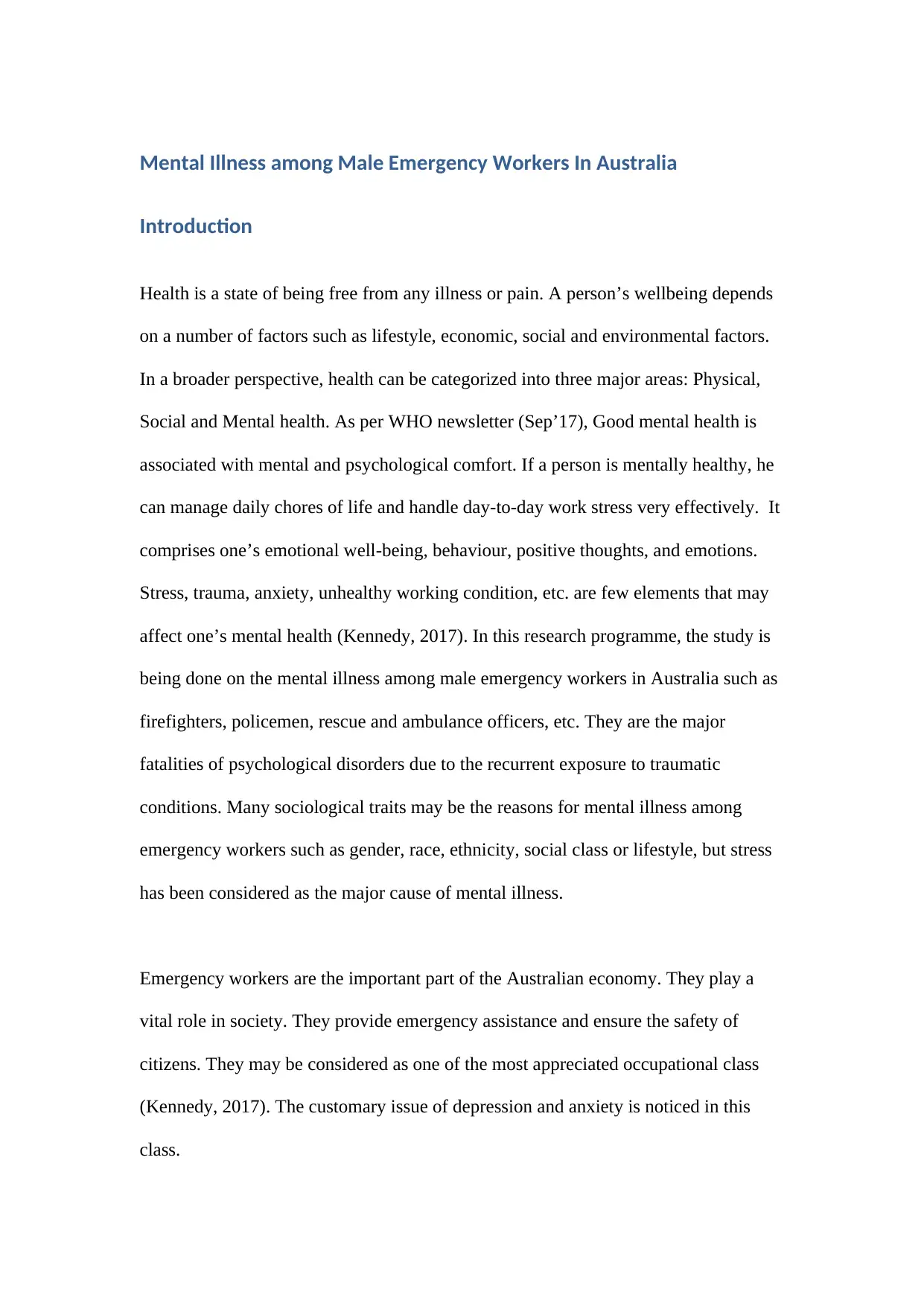
Mental Illness among Male Emergency Workers In Australia
Introduction
Health is a state of being free from any illness or pain. A person’s wellbeing depends
on a number of factors such as lifestyle, economic, social and environmental factors.
In a broader perspective, health can be categorized into three major areas: Physical,
Social and Mental health. As per WHO newsletter (Sep’17), Good mental health is
associated with mental and psychological comfort. If a person is mentally healthy, he
can manage daily chores of life and handle day-to-day work stress very effectively. It
comprises one’s emotional well-being, behaviour, positive thoughts, and emotions.
Stress, trauma, anxiety, unhealthy working condition, etc. are few elements that may
affect one’s mental health (Kennedy, 2017). In this research programme, the study is
being done on the mental illness among male emergency workers in Australia such as
firefighters, policemen, rescue and ambulance officers, etc. They are the major
fatalities of psychological disorders due to the recurrent exposure to traumatic
conditions. Many sociological traits may be the reasons for mental illness among
emergency workers such as gender, race, ethnicity, social class or lifestyle, but stress
has been considered as the major cause of mental illness.
Emergency workers are the important part of the Australian economy. They play a
vital role in society. They provide emergency assistance and ensure the safety of
citizens. They may be considered as one of the most appreciated occupational class
(Kennedy, 2017). The customary issue of depression and anxiety is noticed in this
class.
Introduction
Health is a state of being free from any illness or pain. A person’s wellbeing depends
on a number of factors such as lifestyle, economic, social and environmental factors.
In a broader perspective, health can be categorized into three major areas: Physical,
Social and Mental health. As per WHO newsletter (Sep’17), Good mental health is
associated with mental and psychological comfort. If a person is mentally healthy, he
can manage daily chores of life and handle day-to-day work stress very effectively. It
comprises one’s emotional well-being, behaviour, positive thoughts, and emotions.
Stress, trauma, anxiety, unhealthy working condition, etc. are few elements that may
affect one’s mental health (Kennedy, 2017). In this research programme, the study is
being done on the mental illness among male emergency workers in Australia such as
firefighters, policemen, rescue and ambulance officers, etc. They are the major
fatalities of psychological disorders due to the recurrent exposure to traumatic
conditions. Many sociological traits may be the reasons for mental illness among
emergency workers such as gender, race, ethnicity, social class or lifestyle, but stress
has been considered as the major cause of mental illness.
Emergency workers are the important part of the Australian economy. They play a
vital role in society. They provide emergency assistance and ensure the safety of
citizens. They may be considered as one of the most appreciated occupational class
(Kennedy, 2017). The customary issue of depression and anxiety is noticed in this
class.
Paraphrase This Document
Need a fresh take? Get an instant paraphrase of this document with our AI Paraphraser
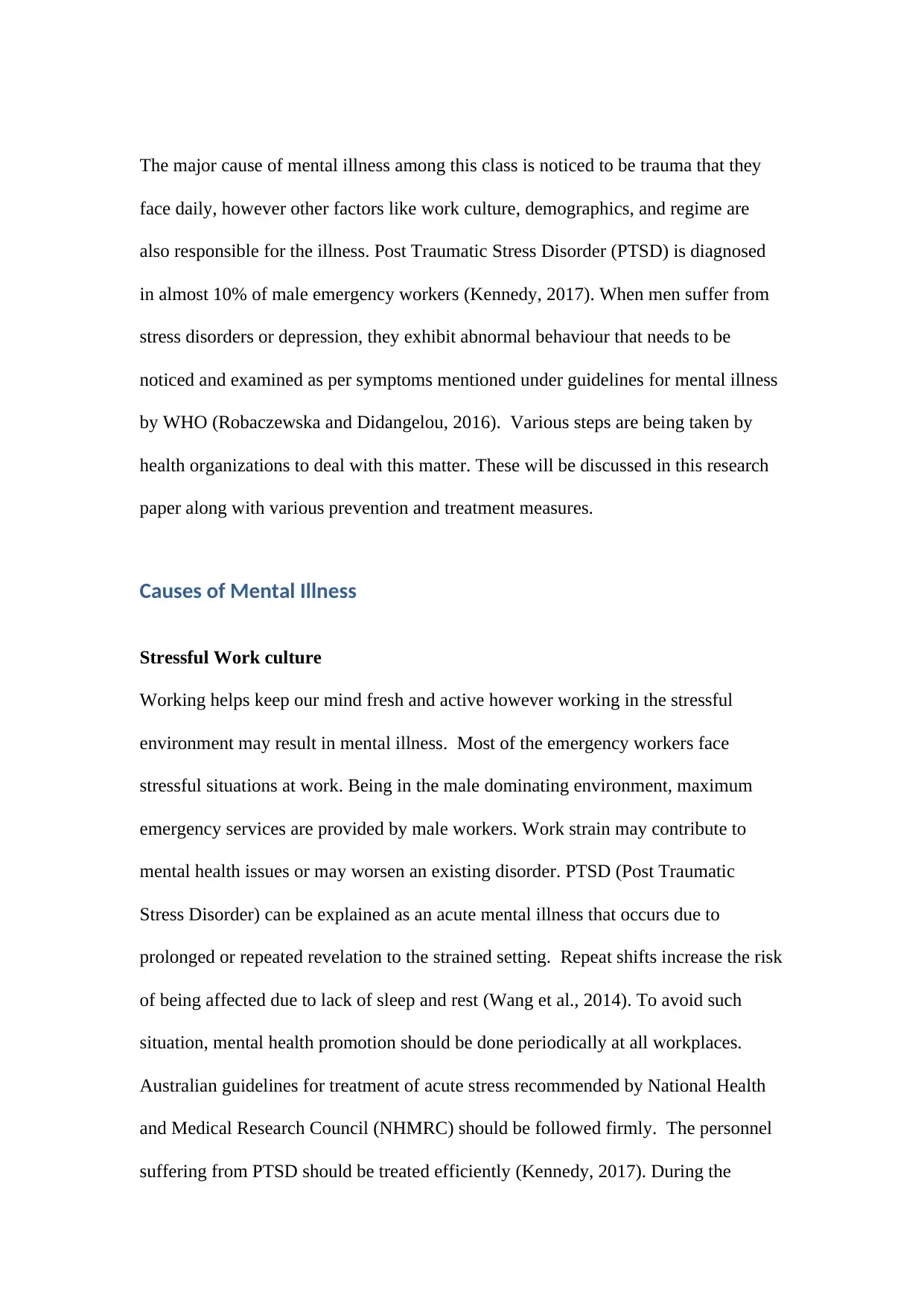
The major cause of mental illness among this class is noticed to be trauma that they
face daily, however other factors like work culture, demographics, and regime are
also responsible for the illness. Post Traumatic Stress Disorder (PTSD) is diagnosed
in almost 10% of male emergency workers (Kennedy, 2017). When men suffer from
stress disorders or depression, they exhibit abnormal behaviour that needs to be
noticed and examined as per symptoms mentioned under guidelines for mental illness
by WHO (Robaczewska and Didangelou, 2016). Various steps are being taken by
health organizations to deal with this matter. These will be discussed in this research
paper along with various prevention and treatment measures.
Causes of Mental Illness
Stressful Work culture
Working helps keep our mind fresh and active however working in the stressful
environment may result in mental illness. Most of the emergency workers face
stressful situations at work. Being in the male dominating environment, maximum
emergency services are provided by male workers. Work strain may contribute to
mental health issues or may worsen an existing disorder. PTSD (Post Traumatic
Stress Disorder) can be explained as an acute mental illness that occurs due to
prolonged or repeated revelation to the strained setting. Repeat shifts increase the risk
of being affected due to lack of sleep and rest (Wang et al., 2014). To avoid such
situation, mental health promotion should be done periodically at all workplaces.
Australian guidelines for treatment of acute stress recommended by National Health
and Medical Research Council (NHMRC) should be followed firmly. The personnel
suffering from PTSD should be treated efficiently (Kennedy, 2017). During the
face daily, however other factors like work culture, demographics, and regime are
also responsible for the illness. Post Traumatic Stress Disorder (PTSD) is diagnosed
in almost 10% of male emergency workers (Kennedy, 2017). When men suffer from
stress disorders or depression, they exhibit abnormal behaviour that needs to be
noticed and examined as per symptoms mentioned under guidelines for mental illness
by WHO (Robaczewska and Didangelou, 2016). Various steps are being taken by
health organizations to deal with this matter. These will be discussed in this research
paper along with various prevention and treatment measures.
Causes of Mental Illness
Stressful Work culture
Working helps keep our mind fresh and active however working in the stressful
environment may result in mental illness. Most of the emergency workers face
stressful situations at work. Being in the male dominating environment, maximum
emergency services are provided by male workers. Work strain may contribute to
mental health issues or may worsen an existing disorder. PTSD (Post Traumatic
Stress Disorder) can be explained as an acute mental illness that occurs due to
prolonged or repeated revelation to the strained setting. Repeat shifts increase the risk
of being affected due to lack of sleep and rest (Wang et al., 2014). To avoid such
situation, mental health promotion should be done periodically at all workplaces.
Australian guidelines for treatment of acute stress recommended by National Health
and Medical Research Council (NHMRC) should be followed firmly. The personnel
suffering from PTSD should be treated efficiently (Kennedy, 2017). During the
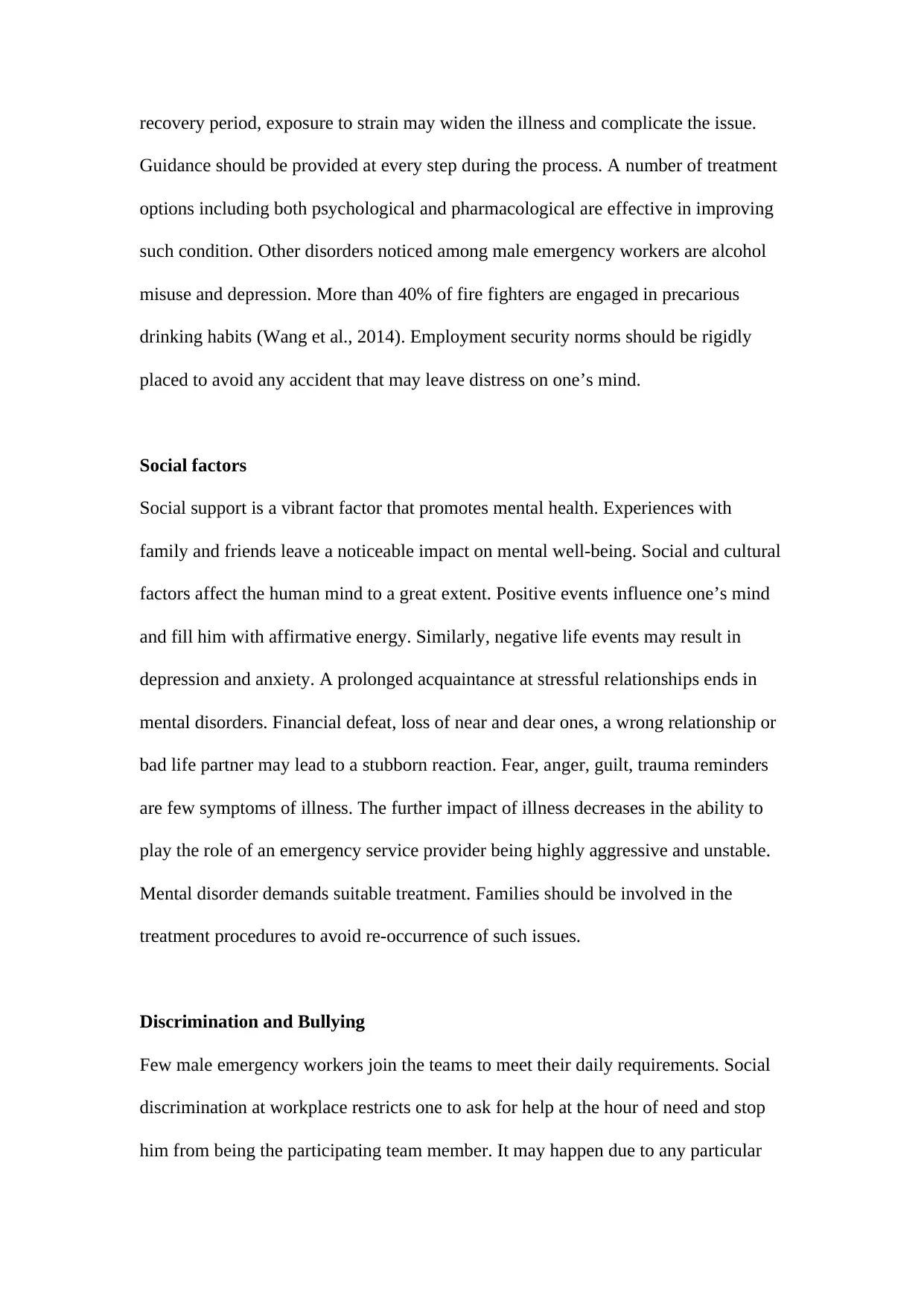
recovery period, exposure to strain may widen the illness and complicate the issue.
Guidance should be provided at every step during the process. A number of treatment
options including both psychological and pharmacological are effective in improving
such condition. Other disorders noticed among male emergency workers are alcohol
misuse and depression. More than 40% of fire fighters are engaged in precarious
drinking habits (Wang et al., 2014). Employment security norms should be rigidly
placed to avoid any accident that may leave distress on one’s mind.
Social factors
Social support is a vibrant factor that promotes mental health. Experiences with
family and friends leave a noticeable impact on mental well-being. Social and cultural
factors affect the human mind to a great extent. Positive events influence one’s mind
and fill him with affirmative energy. Similarly, negative life events may result in
depression and anxiety. A prolonged acquaintance at stressful relationships ends in
mental disorders. Financial defeat, loss of near and dear ones, a wrong relationship or
bad life partner may lead to a stubborn reaction. Fear, anger, guilt, trauma reminders
are few symptoms of illness. The further impact of illness decreases in the ability to
play the role of an emergency service provider being highly aggressive and unstable.
Mental disorder demands suitable treatment. Families should be involved in the
treatment procedures to avoid re-occurrence of such issues.
Discrimination and Bullying
Few male emergency workers join the teams to meet their daily requirements. Social
discrimination at workplace restricts one to ask for help at the hour of need and stop
him from being the participating team member. It may happen due to any particular
Guidance should be provided at every step during the process. A number of treatment
options including both psychological and pharmacological are effective in improving
such condition. Other disorders noticed among male emergency workers are alcohol
misuse and depression. More than 40% of fire fighters are engaged in precarious
drinking habits (Wang et al., 2014). Employment security norms should be rigidly
placed to avoid any accident that may leave distress on one’s mind.
Social factors
Social support is a vibrant factor that promotes mental health. Experiences with
family and friends leave a noticeable impact on mental well-being. Social and cultural
factors affect the human mind to a great extent. Positive events influence one’s mind
and fill him with affirmative energy. Similarly, negative life events may result in
depression and anxiety. A prolonged acquaintance at stressful relationships ends in
mental disorders. Financial defeat, loss of near and dear ones, a wrong relationship or
bad life partner may lead to a stubborn reaction. Fear, anger, guilt, trauma reminders
are few symptoms of illness. The further impact of illness decreases in the ability to
play the role of an emergency service provider being highly aggressive and unstable.
Mental disorder demands suitable treatment. Families should be involved in the
treatment procedures to avoid re-occurrence of such issues.
Discrimination and Bullying
Few male emergency workers join the teams to meet their daily requirements. Social
discrimination at workplace restricts one to ask for help at the hour of need and stop
him from being the participating team member. It may happen due to any particular
⊘ This is a preview!⊘
Do you want full access?
Subscribe today to unlock all pages.

Trusted by 1+ million students worldwide
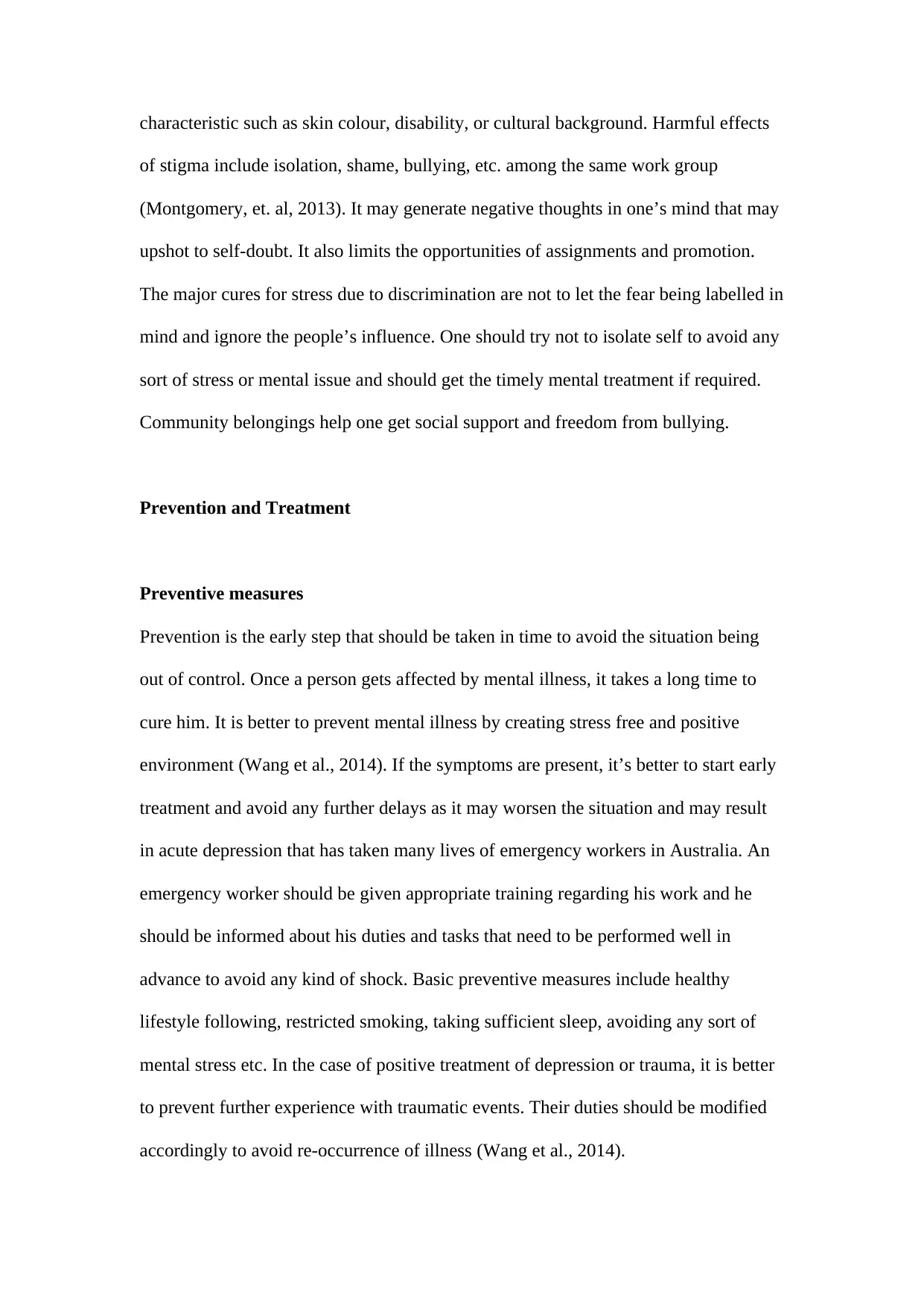
characteristic such as skin colour, disability, or cultural background. Harmful effects
of stigma include isolation, shame, bullying, etc. among the same work group
(Montgomery, et. al, 2013). It may generate negative thoughts in one’s mind that may
upshot to self-doubt. It also limits the opportunities of assignments and promotion.
The major cures for stress due to discrimination are not to let the fear being labelled in
mind and ignore the people’s influence. One should try not to isolate self to avoid any
sort of stress or mental issue and should get the timely mental treatment if required.
Community belongings help one get social support and freedom from bullying.
Prevention and Treatment
Preventive measures
Prevention is the early step that should be taken in time to avoid the situation being
out of control. Once a person gets affected by mental illness, it takes a long time to
cure him. It is better to prevent mental illness by creating stress free and positive
environment (Wang et al., 2014). If the symptoms are present, it’s better to start early
treatment and avoid any further delays as it may worsen the situation and may result
in acute depression that has taken many lives of emergency workers in Australia. An
emergency worker should be given appropriate training regarding his work and he
should be informed about his duties and tasks that need to be performed well in
advance to avoid any kind of shock. Basic preventive measures include healthy
lifestyle following, restricted smoking, taking sufficient sleep, avoiding any sort of
mental stress etc. In the case of positive treatment of depression or trauma, it is better
to prevent further experience with traumatic events. Their duties should be modified
accordingly to avoid re-occurrence of illness (Wang et al., 2014).
of stigma include isolation, shame, bullying, etc. among the same work group
(Montgomery, et. al, 2013). It may generate negative thoughts in one’s mind that may
upshot to self-doubt. It also limits the opportunities of assignments and promotion.
The major cures for stress due to discrimination are not to let the fear being labelled in
mind and ignore the people’s influence. One should try not to isolate self to avoid any
sort of stress or mental issue and should get the timely mental treatment if required.
Community belongings help one get social support and freedom from bullying.
Prevention and Treatment
Preventive measures
Prevention is the early step that should be taken in time to avoid the situation being
out of control. Once a person gets affected by mental illness, it takes a long time to
cure him. It is better to prevent mental illness by creating stress free and positive
environment (Wang et al., 2014). If the symptoms are present, it’s better to start early
treatment and avoid any further delays as it may worsen the situation and may result
in acute depression that has taken many lives of emergency workers in Australia. An
emergency worker should be given appropriate training regarding his work and he
should be informed about his duties and tasks that need to be performed well in
advance to avoid any kind of shock. Basic preventive measures include healthy
lifestyle following, restricted smoking, taking sufficient sleep, avoiding any sort of
mental stress etc. In the case of positive treatment of depression or trauma, it is better
to prevent further experience with traumatic events. Their duties should be modified
accordingly to avoid re-occurrence of illness (Wang et al., 2014).
Paraphrase This Document
Need a fresh take? Get an instant paraphrase of this document with our AI Paraphraser
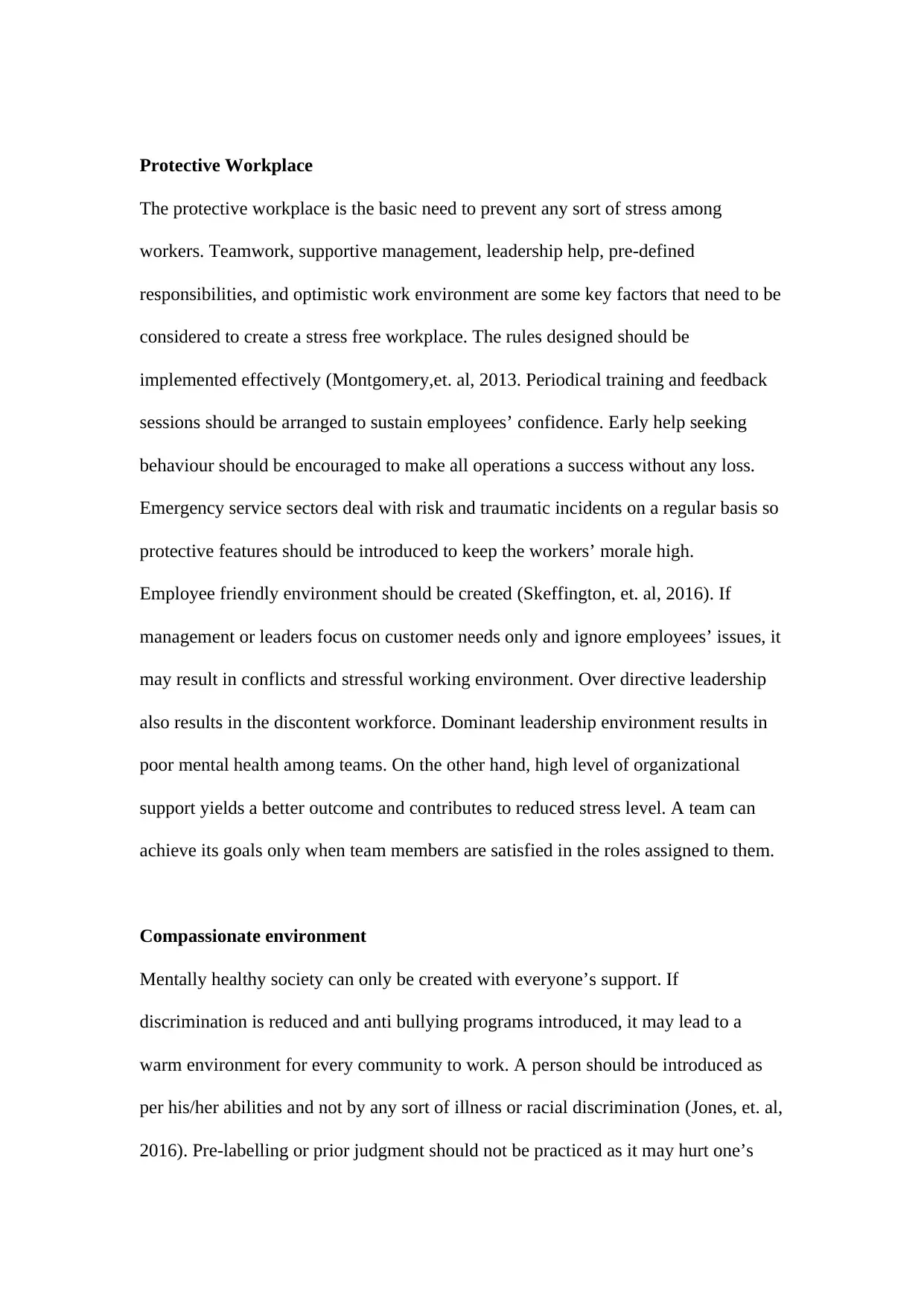
Protective Workplace
The protective workplace is the basic need to prevent any sort of stress among
workers. Teamwork, supportive management, leadership help, pre-defined
responsibilities, and optimistic work environment are some key factors that need to be
considered to create a stress free workplace. The rules designed should be
implemented effectively (Montgomery,et. al, 2013. Periodical training and feedback
sessions should be arranged to sustain employees’ confidence. Early help seeking
behaviour should be encouraged to make all operations a success without any loss.
Emergency service sectors deal with risk and traumatic incidents on a regular basis so
protective features should be introduced to keep the workers’ morale high.
Employee friendly environment should be created (Skeffington, et. al, 2016). If
management or leaders focus on customer needs only and ignore employees’ issues, it
may result in conflicts and stressful working environment. Over directive leadership
also results in the discontent workforce. Dominant leadership environment results in
poor mental health among teams. On the other hand, high level of organizational
support yields a better outcome and contributes to reduced stress level. A team can
achieve its goals only when team members are satisfied in the roles assigned to them.
Compassionate environment
Mentally healthy society can only be created with everyone’s support. If
discrimination is reduced and anti bullying programs introduced, it may lead to a
warm environment for every community to work. A person should be introduced as
per his/her abilities and not by any sort of illness or racial discrimination (Jones, et. al,
2016). Pre-labelling or prior judgment should not be practiced as it may hurt one’s
The protective workplace is the basic need to prevent any sort of stress among
workers. Teamwork, supportive management, leadership help, pre-defined
responsibilities, and optimistic work environment are some key factors that need to be
considered to create a stress free workplace. The rules designed should be
implemented effectively (Montgomery,et. al, 2013. Periodical training and feedback
sessions should be arranged to sustain employees’ confidence. Early help seeking
behaviour should be encouraged to make all operations a success without any loss.
Emergency service sectors deal with risk and traumatic incidents on a regular basis so
protective features should be introduced to keep the workers’ morale high.
Employee friendly environment should be created (Skeffington, et. al, 2016). If
management or leaders focus on customer needs only and ignore employees’ issues, it
may result in conflicts and stressful working environment. Over directive leadership
also results in the discontent workforce. Dominant leadership environment results in
poor mental health among teams. On the other hand, high level of organizational
support yields a better outcome and contributes to reduced stress level. A team can
achieve its goals only when team members are satisfied in the roles assigned to them.
Compassionate environment
Mentally healthy society can only be created with everyone’s support. If
discrimination is reduced and anti bullying programs introduced, it may lead to a
warm environment for every community to work. A person should be introduced as
per his/her abilities and not by any sort of illness or racial discrimination (Jones, et. al,
2016). Pre-labelling or prior judgment should not be practiced as it may hurt one’s
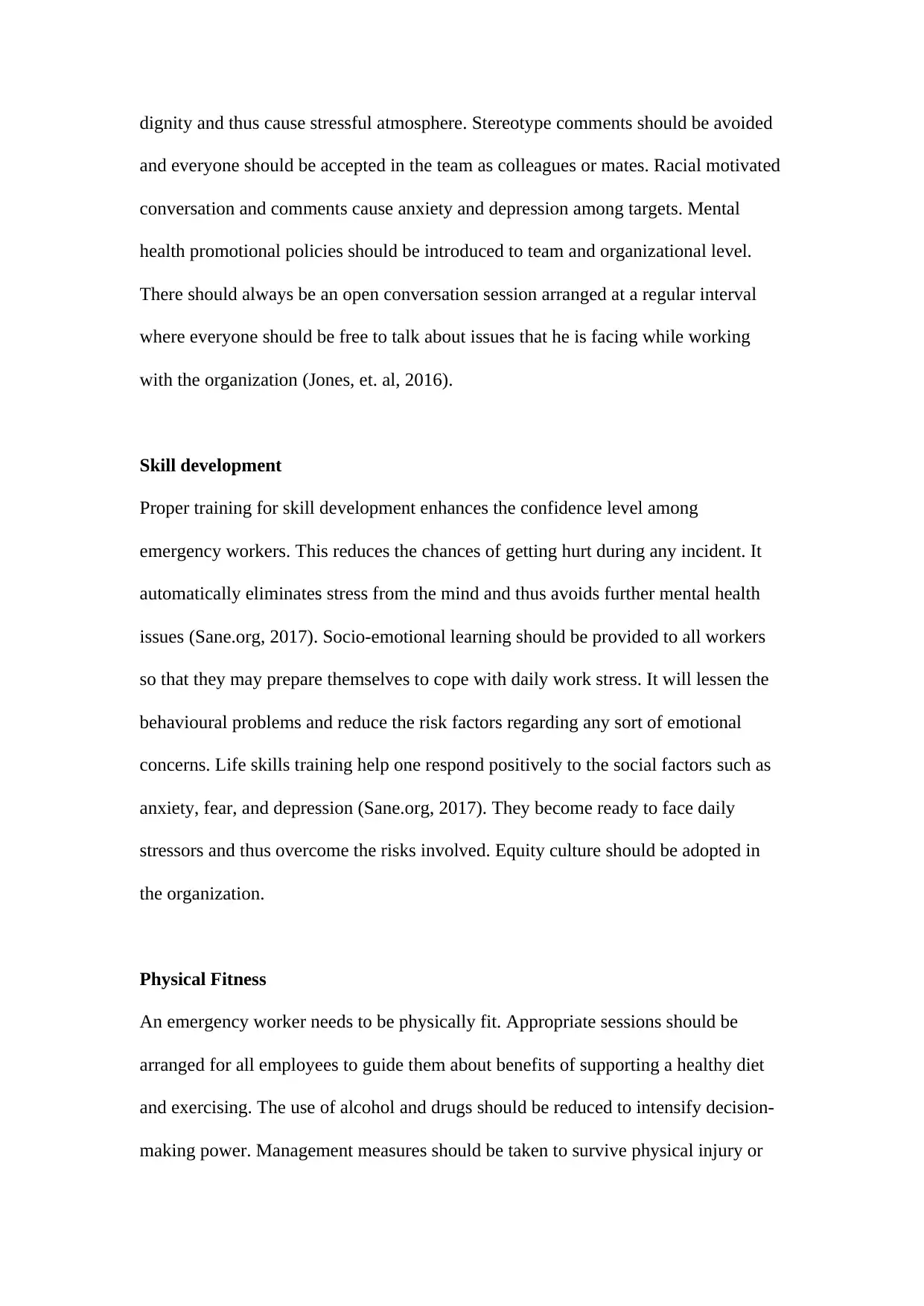
dignity and thus cause stressful atmosphere. Stereotype comments should be avoided
and everyone should be accepted in the team as colleagues or mates. Racial motivated
conversation and comments cause anxiety and depression among targets. Mental
health promotional policies should be introduced to team and organizational level.
There should always be an open conversation session arranged at a regular interval
where everyone should be free to talk about issues that he is facing while working
with the organization (Jones, et. al, 2016).
Skill development
Proper training for skill development enhances the confidence level among
emergency workers. This reduces the chances of getting hurt during any incident. It
automatically eliminates stress from the mind and thus avoids further mental health
issues (Sane.org, 2017). Socio-emotional learning should be provided to all workers
so that they may prepare themselves to cope with daily work stress. It will lessen the
behavioural problems and reduce the risk factors regarding any sort of emotional
concerns. Life skills training help one respond positively to the social factors such as
anxiety, fear, and depression (Sane.org, 2017). They become ready to face daily
stressors and thus overcome the risks involved. Equity culture should be adopted in
the organization.
Physical Fitness
An emergency worker needs to be physically fit. Appropriate sessions should be
arranged for all employees to guide them about benefits of supporting a healthy diet
and exercising. The use of alcohol and drugs should be reduced to intensify decision-
making power. Management measures should be taken to survive physical injury or
and everyone should be accepted in the team as colleagues or mates. Racial motivated
conversation and comments cause anxiety and depression among targets. Mental
health promotional policies should be introduced to team and organizational level.
There should always be an open conversation session arranged at a regular interval
where everyone should be free to talk about issues that he is facing while working
with the organization (Jones, et. al, 2016).
Skill development
Proper training for skill development enhances the confidence level among
emergency workers. This reduces the chances of getting hurt during any incident. It
automatically eliminates stress from the mind and thus avoids further mental health
issues (Sane.org, 2017). Socio-emotional learning should be provided to all workers
so that they may prepare themselves to cope with daily work stress. It will lessen the
behavioural problems and reduce the risk factors regarding any sort of emotional
concerns. Life skills training help one respond positively to the social factors such as
anxiety, fear, and depression (Sane.org, 2017). They become ready to face daily
stressors and thus overcome the risks involved. Equity culture should be adopted in
the organization.
Physical Fitness
An emergency worker needs to be physically fit. Appropriate sessions should be
arranged for all employees to guide them about benefits of supporting a healthy diet
and exercising. The use of alcohol and drugs should be reduced to intensify decision-
making power. Management measures should be taken to survive physical injury or
⊘ This is a preview!⊘
Do you want full access?
Subscribe today to unlock all pages.

Trusted by 1+ million students worldwide
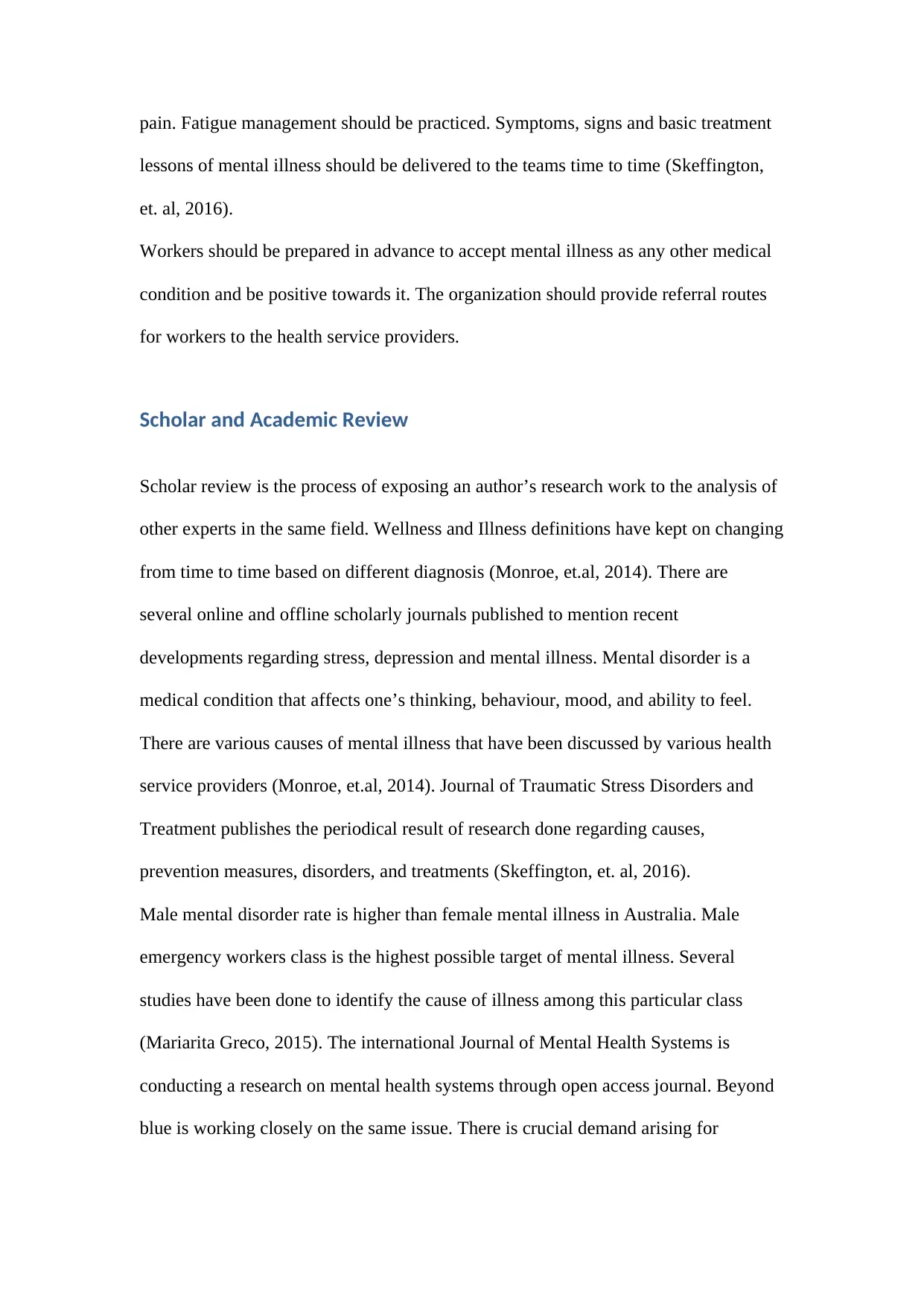
pain. Fatigue management should be practiced. Symptoms, signs and basic treatment
lessons of mental illness should be delivered to the teams time to time (Skeffington,
et. al, 2016).
Workers should be prepared in advance to accept mental illness as any other medical
condition and be positive towards it. The organization should provide referral routes
for workers to the health service providers.
Scholar and Academic Review
Scholar review is the process of exposing an author’s research work to the analysis of
other experts in the same field. Wellness and Illness definitions have kept on changing
from time to time based on different diagnosis (Monroe, et.al, 2014). There are
several online and offline scholarly journals published to mention recent
developments regarding stress, depression and mental illness. Mental disorder is a
medical condition that affects one’s thinking, behaviour, mood, and ability to feel.
There are various causes of mental illness that have been discussed by various health
service providers (Monroe, et.al, 2014). Journal of Traumatic Stress Disorders and
Treatment publishes the periodical result of research done regarding causes,
prevention measures, disorders, and treatments (Skeffington, et. al, 2016).
Male mental disorder rate is higher than female mental illness in Australia. Male
emergency workers class is the highest possible target of mental illness. Several
studies have been done to identify the cause of illness among this particular class
(Mariarita Greco, 2015). The international Journal of Mental Health Systems is
conducting a research on mental health systems through open access journal. Beyond
blue is working closely on the same issue. There is crucial demand arising for
lessons of mental illness should be delivered to the teams time to time (Skeffington,
et. al, 2016).
Workers should be prepared in advance to accept mental illness as any other medical
condition and be positive towards it. The organization should provide referral routes
for workers to the health service providers.
Scholar and Academic Review
Scholar review is the process of exposing an author’s research work to the analysis of
other experts in the same field. Wellness and Illness definitions have kept on changing
from time to time based on different diagnosis (Monroe, et.al, 2014). There are
several online and offline scholarly journals published to mention recent
developments regarding stress, depression and mental illness. Mental disorder is a
medical condition that affects one’s thinking, behaviour, mood, and ability to feel.
There are various causes of mental illness that have been discussed by various health
service providers (Monroe, et.al, 2014). Journal of Traumatic Stress Disorders and
Treatment publishes the periodical result of research done regarding causes,
prevention measures, disorders, and treatments (Skeffington, et. al, 2016).
Male mental disorder rate is higher than female mental illness in Australia. Male
emergency workers class is the highest possible target of mental illness. Several
studies have been done to identify the cause of illness among this particular class
(Mariarita Greco, 2015). The international Journal of Mental Health Systems is
conducting a research on mental health systems through open access journal. Beyond
blue is working closely on the same issue. There is crucial demand arising for
Paraphrase This Document
Need a fresh take? Get an instant paraphrase of this document with our AI Paraphraser
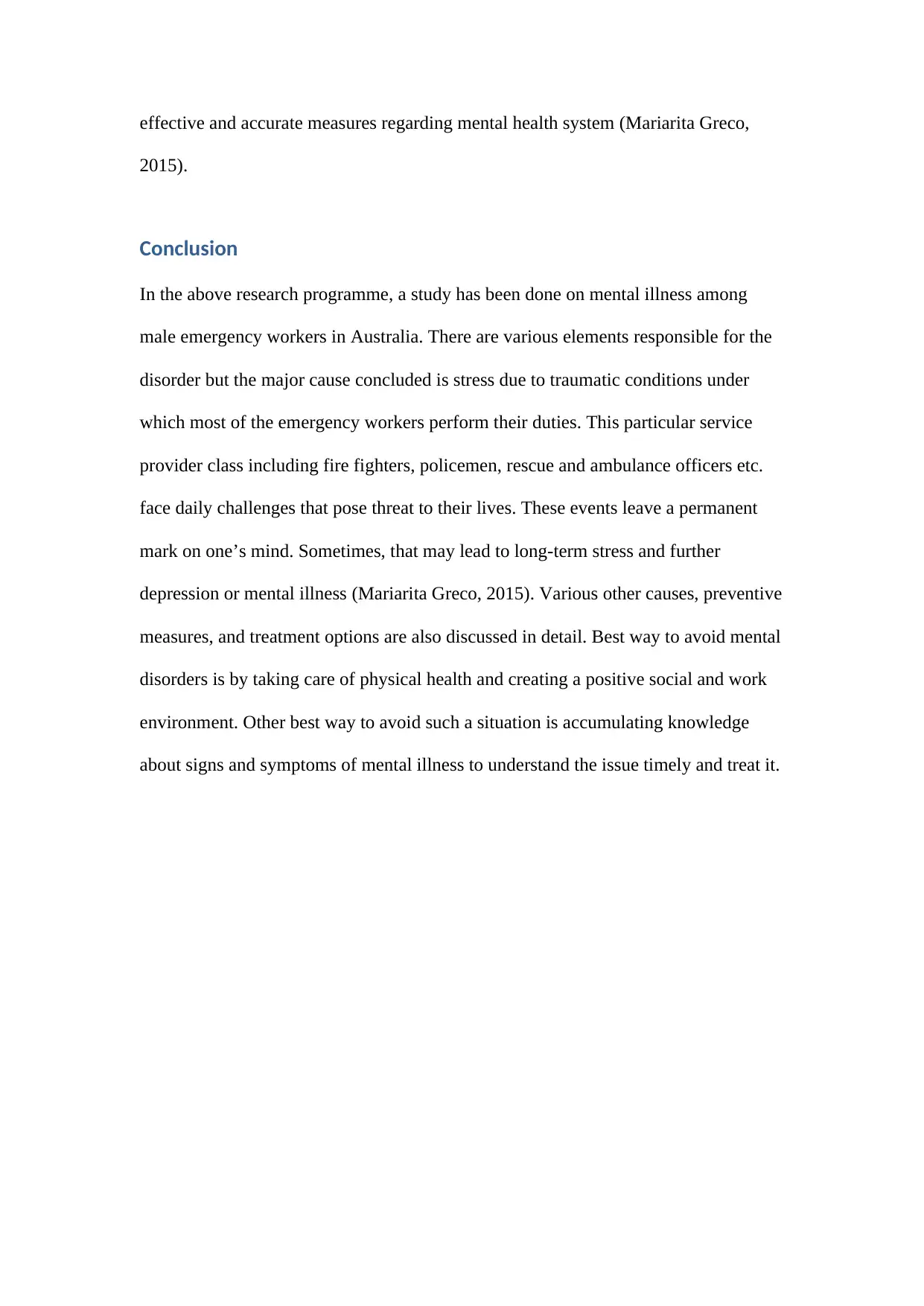
effective and accurate measures regarding mental health system (Mariarita Greco,
2015).
Conclusion
In the above research programme, a study has been done on mental illness among
male emergency workers in Australia. There are various elements responsible for the
disorder but the major cause concluded is stress due to traumatic conditions under
which most of the emergency workers perform their duties. This particular service
provider class including fire fighters, policemen, rescue and ambulance officers etc.
face daily challenges that pose threat to their lives. These events leave a permanent
mark on one’s mind. Sometimes, that may lead to long-term stress and further
depression or mental illness (Mariarita Greco, 2015). Various other causes, preventive
measures, and treatment options are also discussed in detail. Best way to avoid mental
disorders is by taking care of physical health and creating a positive social and work
environment. Other best way to avoid such a situation is accumulating knowledge
about signs and symptoms of mental illness to understand the issue timely and treat it.
2015).
Conclusion
In the above research programme, a study has been done on mental illness among
male emergency workers in Australia. There are various elements responsible for the
disorder but the major cause concluded is stress due to traumatic conditions under
which most of the emergency workers perform their duties. This particular service
provider class including fire fighters, policemen, rescue and ambulance officers etc.
face daily challenges that pose threat to their lives. These events leave a permanent
mark on one’s mind. Sometimes, that may lead to long-term stress and further
depression or mental illness (Mariarita Greco, 2015). Various other causes, preventive
measures, and treatment options are also discussed in detail. Best way to avoid mental
disorders is by taking care of physical health and creating a positive social and work
environment. Other best way to avoid such a situation is accumulating knowledge
about signs and symptoms of mental illness to understand the issue timely and treat it.
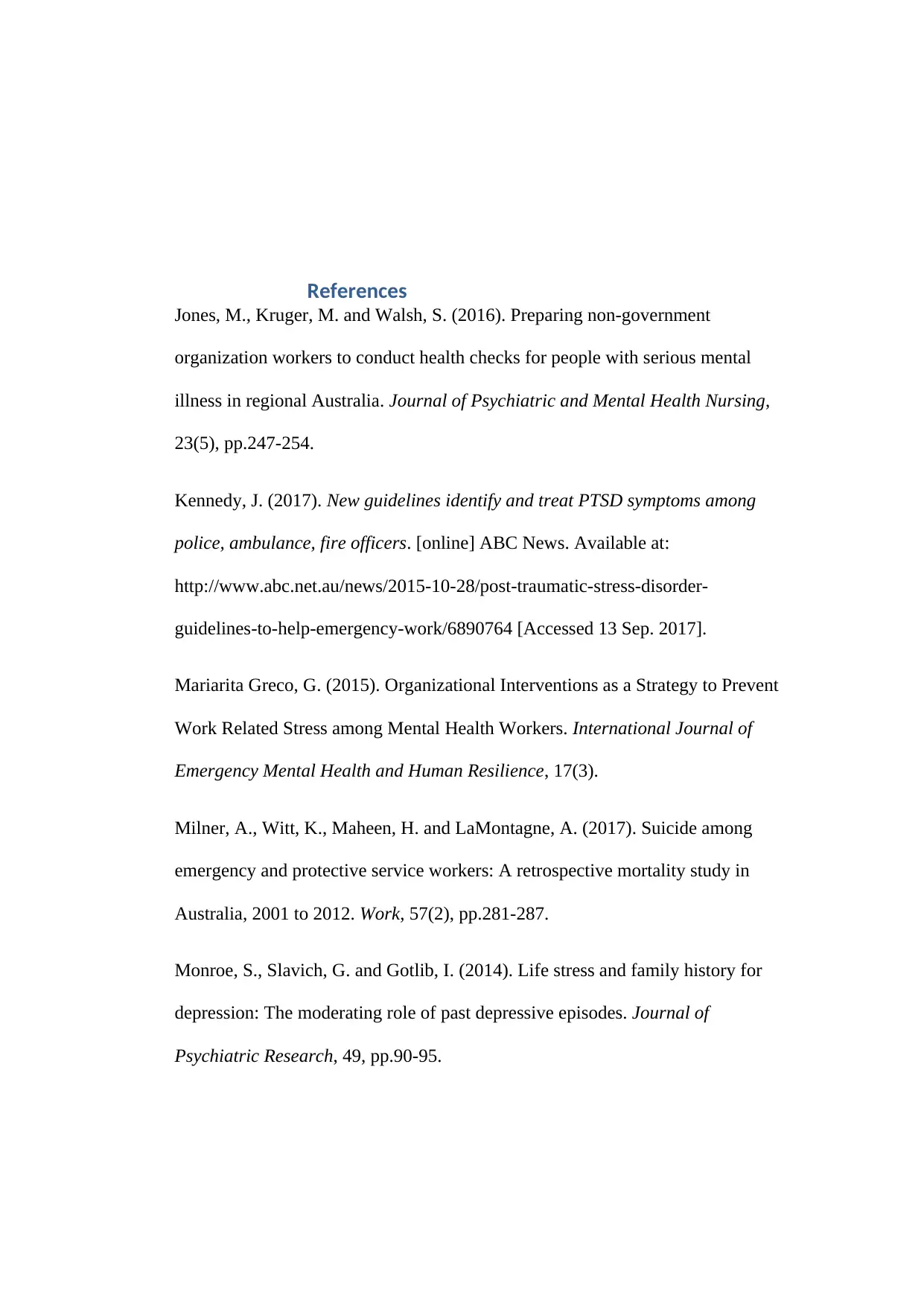
References
Jones, M., Kruger, M. and Walsh, S. (2016). Preparing non-government
organization workers to conduct health checks for people with serious mental
illness in regional Australia. Journal of Psychiatric and Mental Health Nursing,
23(5), pp.247-254.
Kennedy, J. (2017). New guidelines identify and treat PTSD symptoms among
police, ambulance, fire officers. [online] ABC News. Available at:
http://www.abc.net.au/news/2015-10-28/post-traumatic-stress-disorder-
guidelines-to-help-emergency-work/6890764 [Accessed 13 Sep. 2017].
Mariarita Greco, G. (2015). Organizational Interventions as a Strategy to Prevent
Work Related Stress among Mental Health Workers. International Journal of
Emergency Mental Health and Human Resilience, 17(3).
Milner, A., Witt, K., Maheen, H. and LaMontagne, A. (2017). Suicide among
emergency and protective service workers: A retrospective mortality study in
Australia, 2001 to 2012. Work, 57(2), pp.281-287.
Monroe, S., Slavich, G. and Gotlib, I. (2014). Life stress and family history for
depression: The moderating role of past depressive episodes. Journal of
Psychiatric Research, 49, pp.90-95.
Jones, M., Kruger, M. and Walsh, S. (2016). Preparing non-government
organization workers to conduct health checks for people with serious mental
illness in regional Australia. Journal of Psychiatric and Mental Health Nursing,
23(5), pp.247-254.
Kennedy, J. (2017). New guidelines identify and treat PTSD symptoms among
police, ambulance, fire officers. [online] ABC News. Available at:
http://www.abc.net.au/news/2015-10-28/post-traumatic-stress-disorder-
guidelines-to-help-emergency-work/6890764 [Accessed 13 Sep. 2017].
Mariarita Greco, G. (2015). Organizational Interventions as a Strategy to Prevent
Work Related Stress among Mental Health Workers. International Journal of
Emergency Mental Health and Human Resilience, 17(3).
Milner, A., Witt, K., Maheen, H. and LaMontagne, A. (2017). Suicide among
emergency and protective service workers: A retrospective mortality study in
Australia, 2001 to 2012. Work, 57(2), pp.281-287.
Monroe, S., Slavich, G. and Gotlib, I. (2014). Life stress and family history for
depression: The moderating role of past depressive episodes. Journal of
Psychiatric Research, 49, pp.90-95.
⊘ This is a preview!⊘
Do you want full access?
Subscribe today to unlock all pages.

Trusted by 1+ million students worldwide
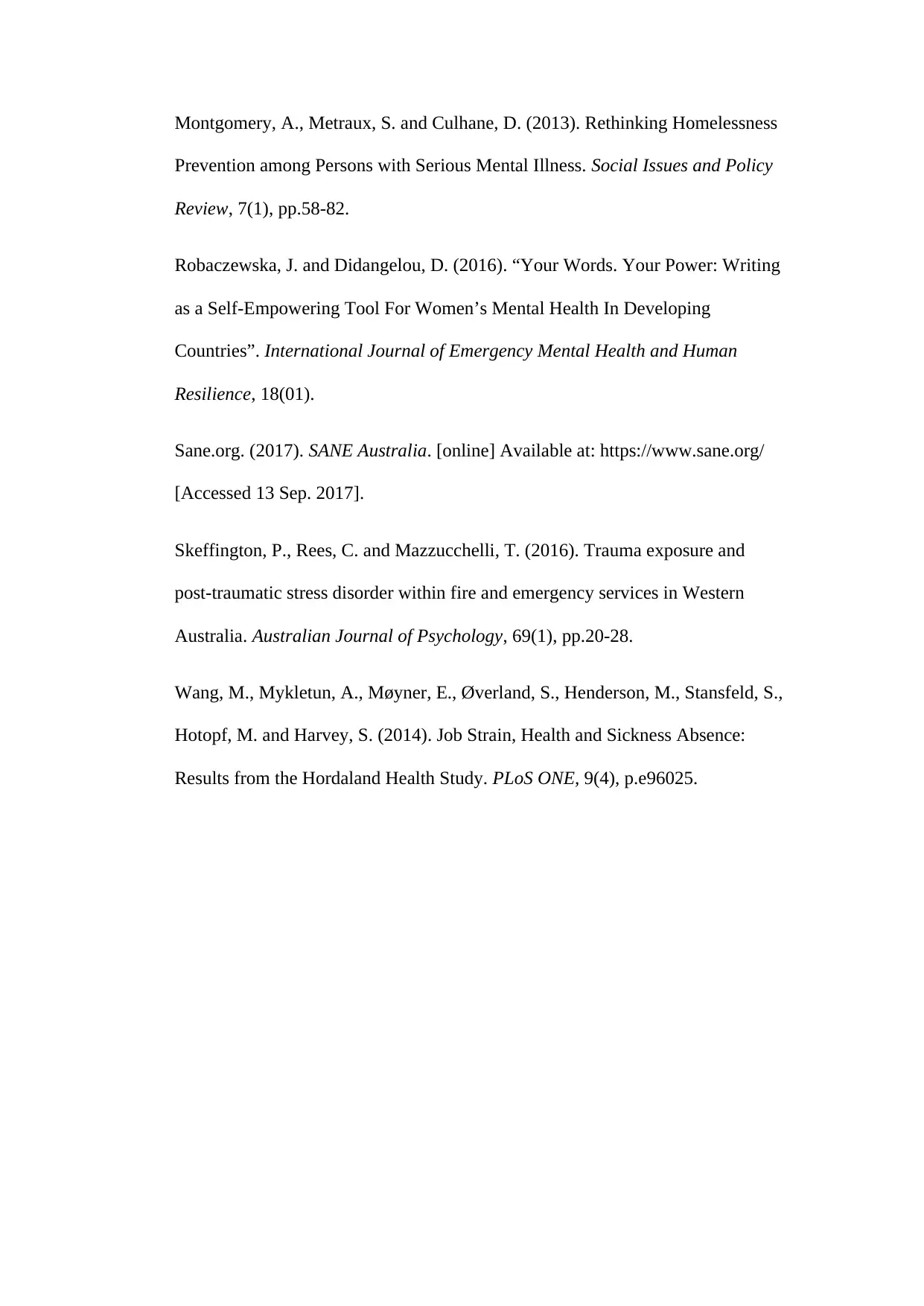
Montgomery, A., Metraux, S. and Culhane, D. (2013). Rethinking Homelessness
Prevention among Persons with Serious Mental Illness. Social Issues and Policy
Review, 7(1), pp.58-82.
Robaczewska, J. and Didangelou, D. (2016). “Your Words. Your Power: Writing
as a Self-Empowering Tool For Women’s Mental Health In Developing
Countries”. International Journal of Emergency Mental Health and Human
Resilience, 18(01).
Sane.org. (2017). SANE Australia. [online] Available at: https://www.sane.org/
[Accessed 13 Sep. 2017].
Skeffington, P., Rees, C. and Mazzucchelli, T. (2016). Trauma exposure and
post-traumatic stress disorder within fire and emergency services in Western
Australia. Australian Journal of Psychology, 69(1), pp.20-28.
Wang, M., Mykletun, A., Møyner, E., Øverland, S., Henderson, M., Stansfeld, S.,
Hotopf, M. and Harvey, S. (2014). Job Strain, Health and Sickness Absence:
Results from the Hordaland Health Study. PLoS ONE, 9(4), p.e96025.
Prevention among Persons with Serious Mental Illness. Social Issues and Policy
Review, 7(1), pp.58-82.
Robaczewska, J. and Didangelou, D. (2016). “Your Words. Your Power: Writing
as a Self-Empowering Tool For Women’s Mental Health In Developing
Countries”. International Journal of Emergency Mental Health and Human
Resilience, 18(01).
Sane.org. (2017). SANE Australia. [online] Available at: https://www.sane.org/
[Accessed 13 Sep. 2017].
Skeffington, P., Rees, C. and Mazzucchelli, T. (2016). Trauma exposure and
post-traumatic stress disorder within fire and emergency services in Western
Australia. Australian Journal of Psychology, 69(1), pp.20-28.
Wang, M., Mykletun, A., Møyner, E., Øverland, S., Henderson, M., Stansfeld, S.,
Hotopf, M. and Harvey, S. (2014). Job Strain, Health and Sickness Absence:
Results from the Hordaland Health Study. PLoS ONE, 9(4), p.e96025.
1 out of 10
Related Documents
Your All-in-One AI-Powered Toolkit for Academic Success.
+13062052269
info@desklib.com
Available 24*7 on WhatsApp / Email
![[object Object]](/_next/static/media/star-bottom.7253800d.svg)
Unlock your academic potential
Copyright © 2020–2026 A2Z Services. All Rights Reserved. Developed and managed by ZUCOL.





